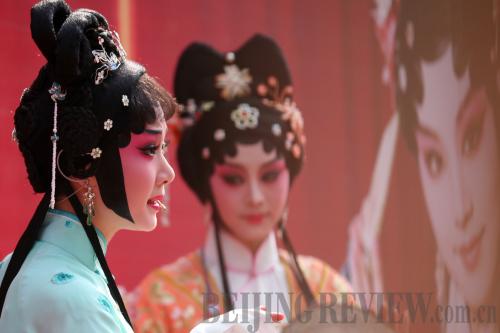|
 |
|
DREAM-LIKE CHARM: Zhu Bingzhen, heroine of the Kunqu Opera play Dream of Red Mansions, performs at the play's press release in Beijing on August 8, 2011 (PU XIANGDONG) |
While shadow puppetry is the latest Chinese item to make the UNESCO list, Kunqu Opera was the first to be inscribed onto it in 2001. Efforts to invigorate this ancient art have already been rewarded.
"As a living performing art, Kunqu Opera should be constantly developed with the changes in real life," said Dong Wei, Director of the Arts Department of the Ministry of Culture, at a meeting to celebrate the 10th anniversary of Kunqu Opera's listing in Beijing in 2011.
With a history of over 600 years, Kunqu Opera is known as the mother of all operas in China. The opera sounds hauntingly graceful. It features good control of the voice and rhythm. When performed, the opera is accompanied by various kinds of traditional Chinese musical instruments. However, this ancient performing art was on the verge of extinction before 2001.
"Years ago, when I was asked by taxi drivers about my job, I felt ashamed to tell him I was a Kunqu actor," said Ke Jun, head of Jiangsu Provincial Kunqu Opera Theater.
"Once, when I performed, there were more than 20 performers on stage, while only three in the audience below. Of the three, one was sleeping, one was walking around and the other was cracking and eating melon seeds," said Ke.
Fortunately, this situation has changed since the opera was recognized by UNESCO in 2001. So far, it has gradually regained dignity and its rightful status in modern society.
"When you find a fabulous thing, you will fall in love with it. When you love it, you will be devoted to it. Kunqu Opera is an art with unique charm. We are determined to be devoted to it and pass it on," said Ke.
In Kunshan, Jiangsu Province, the cradle of Kunqu Opera, a museum was built in 1993 to promote this traditional art.
But the opera is not just a museum piece. It has been regaining popularity. For instance, the most popular play Peony Pavilion, which was based on its namesake ancient romance by Tang Xianzu in the Ming Dynasty (1368-1644), is now staged in theaters, on campuses and at clubs, both at home and abroad.
This owes to the ceaseless efforts of Kunqu Opera lovers such as Ke. In recent years, Ke has devoted himself to breaking the mold and bringing many modern elements into classical plays.
Ke strived to make the opera in tune with the pulse of modern society. During the World Expo in Shanghai in 2010, the Jiangsu Provincial Kunqu Opera Theater cooperated with a Noh theater from Japan. The two created a multi-media Kunqu play on environmental protection. In total, the 20-minute play was performed more than 6,000 times during the expo, attracting large international audiences.
What's more, Ke also cooperated with a lot of big private companies as a means of attracting more social forces into the promotion of the opera. He visited South Korea, Sweden, Japan, India and other countries to introduce the opera, gaining international fame.
"I believe as long as I stick to it, Kunqu Opera can embrace a better future one day," said Ke.
| 